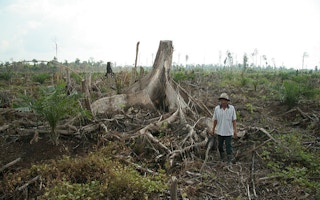Indonesian law already prohibits development on deep peatlands, where the carbon-rich peat soil can extend for many meters below the surface. But the country’s vague peat maps are highly inaccurate. In practice, licenses to establish plantations and carry out other activities on deep peat are frequently handed out — a prime cause of the annual fires, which spread uncontrollably because Indonesia’s vast peat swamp zones have been widely drained and dried for agriculture.
The peatland agency’s indicative maps show roughly 2 million hectares of peat domes, which are especially deep peatlands. About half have already been planted by agribusinesses and farmers.
First, the agency wants to enforce a legal framework to prevent the unplanted peat from being planted, even if it lies within an existing concession.
Second, if the deep peat has already been planted, the agency is advocating an arrangement whereby the planter would be allowed to continue their activities through the end of the first planting cycle, after which the peatland will be restored instead of replanted.
“I am optimistic that companies that follow the rules on peat protection will do better in the end,” Peatland Restoration Agency chief Nazir Foead said.
The agency, known as the BRG, is targeting to restore 2 million hectares of peatland by 2020. The process usually involves blocking canals that have been dug to drain the marshy peat soil so that it can return to its former state.
This story was published with permission from Mongabay.com

















